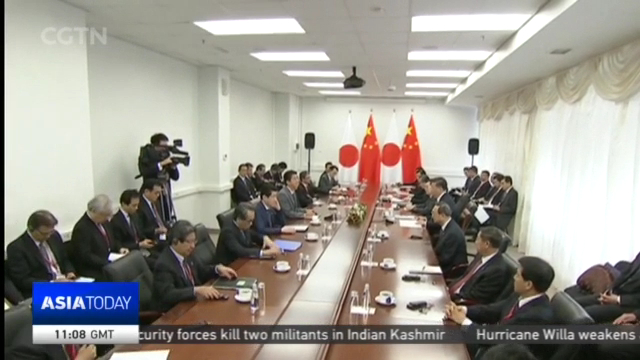
19:40, 24-Oct-2018
Abe's China Trip: Former Japan PM expects Abe's visit to improve relations, deepen cooperation
Updated
19:19, 27-Oct-2018
03:02

Ahead of Shinzo Abe's rare visit to China on Wednesday, Yasuo Fukuda, who was Japan's prime minister from 2007 to 2008, forecasts the direction of relationship between the world's second and the third largest economies. CGTN's Feng Yilei has more.
40 years ago, it was Yasuo Fukuda's father who witnessed the Treaty of Peace and Friendship signed between China and Japan. The document clarifies basic principles for handling historical issues and peaceful development. Decades on, the former Prime Minister says the treaty is still of great significance.
YASUO FUKUDA FORMER JAPANESE PRIME MINISTER "The signing of the treaty made people-to-people exchanges, trade, and many other areas between China and Japan freer than ever."
Abe's visit comes as bilateral ties get back on track, after long-standing tensions over territorial and historical disputes. Experts say China and Japan now seek to drive growth, while facing regional and global uncertainties. The consensus on seeing each other as partners appears to be even more crucial in these changing times. China is set to hold a reception commemorating the treaty's signing. This is seen as a chance for both sides to review the past and chart a new course for relations.
YASUO FUKUDA FORMER JAPANESE PRIME MINISTER "Dialogue between the countries' leaders is significant for developing Sino-Japanese relations. People from both sides are looking forward to that and expect the two countries to reduce differences and join hands together as good neighbors. I hope the leaders can express clearly what the people want."
Economic cooperation will be another key theme of the upcoming visit. The Japanese leader reportedly will bring a large delegation of business leaders to Beijing.
YASUO FUKUDA FORMER JAPANESE PRIME MINISTER "We should push forward collaboration between big enterprises, and then involve medium- and small-sized ones. The leaders' talks are a good opportunity for creating a favorable environment to expand non-governmental contacts."
The two East Asian countries are also set to boost their cooperation on infrastructure projects in other countries, especially under the Belt and Road Initiative. The Chinese government has announced it will hold a forum during Abe's visit to touch on that. And the two countries will closely work together in high-tech, fiscal and financial areas.
YANG BOJIANG, DEPUTY DIRECTOR INSTITUTE FOR JAPANESE STUDIES, CHINESE ACADEMY OF SOCIAL SCIENCES "China and Japan signed the peace treaty on the common ground of being against hegemony as well as on China's opening up. In the present decade, Japanese industries look for expanding markets while China's economic industrial development requires experience from Japan, in terms of energy conservation technologies and coping with an aging society."
YASUO FUKUDA FORMER JAPANESE PRIME MINISTER "China has realized that it should strengthen high-quality growth from now on. In the future, there will be more major changes in technologies, lifestyle, and the world situation. We need to get prepared to cope with these changes together."
FENG YILEI BEIJING "Experts say, at this particular time, Abe's visit is not just a sign of warming relations. Instead, it's more of a solution for both countries to review the twists and turns in their bilateral ties, while deepening cooperation for their shared interests and common problems. FYL, CGTN, BJ."

SITEMAP
Copyright © 2018 CGTN. Beijing ICP prepared NO.16065310-3
Copyright © 2018 CGTN. Beijing ICP prepared NO.16065310-3